牛津英语8bunit6各节教案 (1)
牛津译林版英语 八年级下册 8B Unit 6 reading1 教案
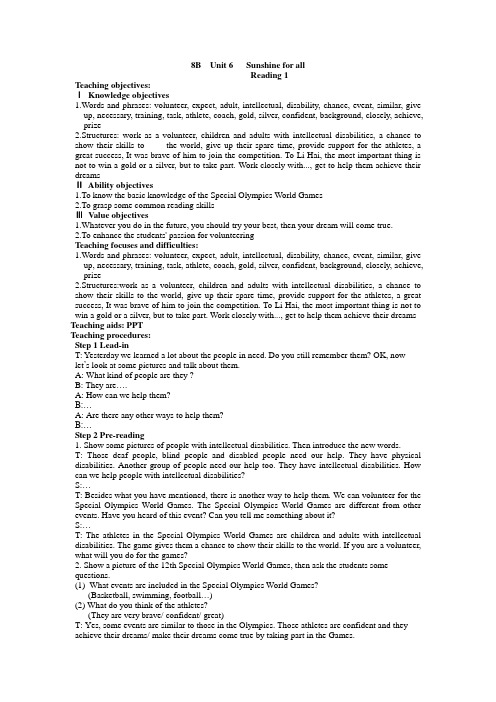
8B Unit 6 Sunshine for allReading 1Teaching objectives:ⅠKnowledge objectives1.Words and phrases: volunteer, expect, adult, intellectual, disability, chance, event, similar, giveup, necessary, training, task, athlete, coach, gold, silver, confident, background, closely, achieve, prize2.Structures: work as a volunteer, children and adults with intellectual disabilities, a chance to show their skills to the world, give up their spare time, provide support for the athletes, a great success, It was brave of him to join the competition. To Li Hai, the most important thing is not to win a gold or a silver, but to take part. Work closely with..., get to help them achieve their dreamsⅡAbility objectives1.To know the basic knowledge of the Special Olympics World Games2.To grasp some common reading skillsⅢValue objectives1.Whatever you do in the future, you should try your best, then your dream will come true.2.To enhance the students' passion for volunteeringTeaching focuses and difficulties:1.Words and phrases: volunteer, expect, adult, intellectual, disability, chance, event, similar, giveup, necessary, training, task, athlete, coach, gold, silver, confident, background, closely, achieve, prize2.Structures:work as a volunteer, children and adults with intellectual disabilities, a chance to show their skills to the world, give up their spare time, provide support for the athletes, a great success, It was brave of him to join the competition. To Li Hai, the most important thing is not to win a gold or a silver, but to take part. Work closely with..., get to help them achieve their dreams Teaching aids: PPTTeaching procedures:Step 1 Lead-inT: Yesterday we learned a lot about the people in need. Do you still remember them? OK, now let’s look at some pictures and talk about them.A: What kind of people are they ?B: They are….A: How can we help them?B:…A: Are there any other ways to help them?B:…Step 2 Pre-reading1. Show some pictures of people with intellectual disabilities. Then introduce the new words.T: Those deaf people, blind people and disabled people need our help. They have physical disabilities. Another group of people need our help too. They have intellectual disabilities. How can we help people with intellectual disabilities?S:…T: Besides what you have mentioned, there is another way to help them. We can volunteer for the Special Olympics World Games. The Special Olympics World Games are different from other events. Have you heard of this event? Can you tell me something about it?S:…T: The athletes in the Special Olympics World Games are children and adults with intellectual disabilities. The game gives them a chance to show their skills to the world. If you are a volunteer, what will you do for the games?2. Show a picture of the 12th Special Olympics World Games, then ask the students some questions.(1) What events are included in the Special Olympics World Games?(Basketball, swimming, football…)(2) What do you think of the athletes?(They are very brave/ confident/ great)T: Yes, some events are similar to those in the Olympics. Those athletes are confident and they achieve their dreams/ make their dreams come true by taking part in the Games.3. Finish the exercises on Page82 B2.Step 3 While-reading1.Today we will read a report on the experience of a volunteer and find the answers to the following questions:(1)What is the name of the volunteers?Liu Ming.(2)What do volunteers need to do for the Special Olympics World Games?They need to provide support for the athletes and help make the event a great success.2. Read the article by yourselves and try to finish Part B1.Main points Paragraph1 An introduction to the Special Olympics World Games 22 Liu Ming′s experience 43 Liu Ming′s feelings about the event 1\54 What volunteers do for the event 3Step 4 Post-reading1.Read then tell true or false1)Liu Ming was a volunteer for the 2007 Special Olympics World Games. (T)2)Liu Ming knew what to expect before he became a volunteer. (F)3)There were only a few events in the 2007 Special Olympics World Games . (F)4)There are over 40,000 volunteers for the 2007 Special Olympics World Games (T)5)Liu Hai was born with intellectual disabilities. (T)6)Liu Hai was sure to win the swimming competition (F)2.Read the report paragraph by paragraph then answer some questions.Paragraph1 :1)What did Liu Ming do in October 2007?He volunteered for the Special Olympics World Games in Shanghai.2)What did he think of his experience?It was the most amazing experience of his life.Paragraph2 :1)What are the Special Olympics World Games for?The Special Olympics World Games give children and adults with intellectual disabilities a chance to showtheir skills to the world .2)What events are included in the Special Olympics World Games?The Games include many events similar to those in the Olympics , such as basketball, football andswimming.Paragraph3 :1)How many people gave up their spare time for the 2007 Special Olympics World Games?Over 40,000 people.2)What did those volunteers do for the Games?They provided support for the athletes and helped make the event a great success. Paragraph4 :1)Who is Li Hai?Li Hai is a young boy from North China. He was born with intellectual disabilities.2)Did Li Hai win a gold in the end?No. He finished fourth.3)How did Li Hai feel after the competition?He felt more confident.Paragraph5 :What is the influence of the Special Olympics World Games?They bring people together.Step 5 PracticeHave an interview about Special Olympics World Games. One will be the reporter and the other will be Li Ming.Show the students some questions like:1.What are the Special Olympics World Games for?2.What events are included in the Special Olympics World Games?3.What did those volunteers do for the Games?4.Did Li Hai win a gold in the end?5.How did Li Hai feel after the competition?6.What is the influence of the Special Olympics World Games? Step 6 Homework1.Read the text correctly and fluently.plete the exercises.Teaching reflections:。
牛津译林版八年级英语下册8B Unit6第1课时教案

牛津译林版八年级英语下册Unit 6Period 1 Comic strips & welcome to the unit(Organizing , People who need help)Teaching goals●To learn some expressions●To learn about people who need helpTeaching proceduresStep 1 Looking and sayingHi, class. Look at the pictures on page 92. Read after me what Hobo and Eddie are saying. Now learn these words and expressions from this part.Make sentences of your own with them.Step 2 Listening and answeringWhat will Hobo and Eddie do to support charities?What is Hobo doing for charity walk?Is Eddie willing to support charities?What does he think of supporting charities?What does Eddie give Hobo?What does Hobo need?What does Eddie think of Hobo’s walk?Step 3 Reading after the tape and discussingRead after the tape sentence by sentence.Is it possible for Hobo to finish his walk?Why or why not?What do we need during ?Step 4 Questioning and answeringWhy are there some charities in the world? (Because there are many people who need help.)What kind of people need help? (The blind, the deaf, the disabled, the elderly, the homeless, the poor.)Look at the pictures on page 93. And read after me the words disabled, elderly, homeless, and deaf. Step 5 Finishing off Part A and BNow let’s go on to label the pictures in Part A using the words from the box.OK. Work in pairs to act out the conversation on page 93 by Arm and Daniel.How can we help people in need?How can we help blind people/homeless people/deaf people…?●For people in wheelchairs, wide sidewalks, ramps and automatic doors are helpful.●For poor people, education programmes that allow them to get better jobs are helpful. Free medical care and affordable housing are also helpful.●Blind people can benefit from Braille signs, spoken announcements rather than written notices, contoured pavements and unobstructed sidewalks.●Elderly people can benefit from public transit that is easy to board, places to sit down outdoors and escalators or lifts instead of stairs.●For homeless people, shelters and kitchens can offer short-term help.●Deaf people can benefit from written notices and a greater awareness of sign language.Make a similar conversation like this.Step 6 Doing an extension activityYou are to make a list of things you would find most difficult to do or you would miss if you were blind, deaf, elderly, homeless, physically disabled or poor.Make sure that you write a few sentences about a person who suffers from any of the conditions shown in the pictures. Write your sentences from that person’s viewpoints.Step 7 Homeworka. Read the comic strips and try to remember it. Try your best to act it out.b. Finish off the exercises in the Evaluation Handbook。
牛津译林版英语 八年级下册 8B Unit 6 Task教案
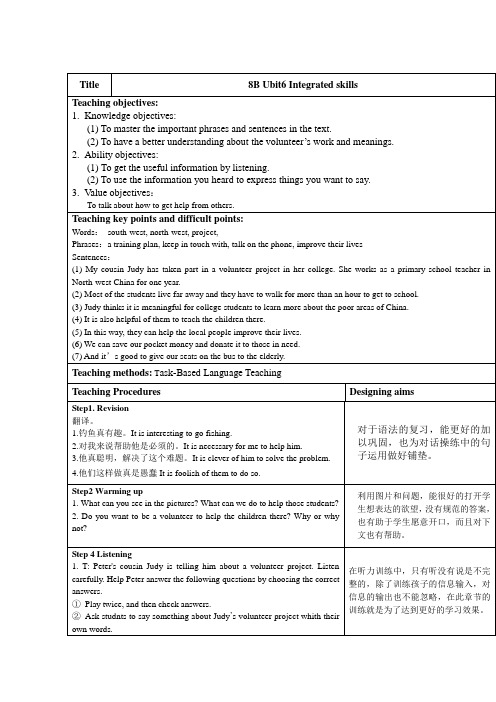
1.钓鱼真有趣。It is interesting to go fishing.
2.对我来说帮助他是必须的。It is necessary for me to help him.
3.他真聪明,解决了这个难题。It is clever of him to solve the problem.
4.他们这样做真是愚蠢It is foolish of them to do so.
绝大部分城里的孩子不喜欢住在山区。
2. keep in touch保持联络
e.g. Wherever you go, keep in touch with me, please.
3. daily life日常生活day (n.) --- daily (adj.)
e.g.日常英语daily English日报daily newspaper
Sentences:
(1) My cousin Judy has taken part in a volunteer project in her college. She works as a primary school teacher in North-westChinafor one year.
(4) It is also helpful of them to teach the children there.
(5) In this way, they can help the local people improve their lives.
(6) We can save our pocket money and donate it to those in need.
利用图片和问题,能很好的打开学生想表达的欲望,没有规范的答案,也有助于学生愿意开口,而且对下文也有帮助。
牛津初中英语8B Unit6教学案

牛津初中英语8B Unit6教学案重点短语Welcome to the unittrain for a charity walk 为一个慈善步行活动受训support me 支持我It’s meaningful to do sth. 做某事是有意义的。
need some more food 需要更多的食物organize a charity walk 组织一次慈善步行活动people who need help = people in need需要帮助的人a disabled person 一位残疾人be blind in …eye 某一只眼睛瞎an elderly person 一位年岁大的人a homeless person 一位无家可归的人deaf people 聋人Readingone of Hong Kong’s biggest fund-raising events香港最大的募集基金活动之一be known as 被作为``````了解/作为`…而闻名people in other parts of Asia and Africa亚洲和非洲其它地区的人be held/take place in November 在11月举行group themselves into a team of four = form groups of four把他们自己组成四人小组join/take part in the charity walk 参加慈善步行a tough /difficult hike 一次艰苦的远足have to finish walking a 100-kilometre trail within 48 hours 不得不在48小时内走完100公里的小路It means that``` 这意味着``````walk for two days and nights without sleep不睡觉走两天两夜walk through eight country parks走过8个郊外公园walk over twenty hills and mountains翻过20座大小山an excellent chance 一个极好的机会plan everything together 一起计划每一件事the team’s finishing time will be recorded整个团队最终所用时间将被记录下来It is necessary/ useful for sb to do sth.对某人来说做某事``````。
8BUnit6Integratedskills教学案例(译林牛津版英语八年级)

8BUnit6Integratedskills教学案例(译林牛津版英语八年级)牛津英语8B Unit6 Integrated skills教学设计学习目标:1)进一步了解有关慈善步行的一些信息,并能从听力材料中获取有用的信息,培养“听说读写”的技能。
2)运用所获取的信息及相关情景完成一封信。
3)根据自己的语言基础能力,就某事给出建议,并对建议作出回应。
学习预习案:1.Discussion:Talk about Oxfam Trailwalker.Talk about it in Pairs, One ask and the other answers.(你可以参考书本94&95页)2.Read and write out the words and know their meanings (加油哟,要比赛的哟!)['unli] [flt] ['p:fikt]['tenn] ['reini] ['mbrel][lst] [waiz] ['mublfun]3. Preview(预习)PartA1 2 3. Try to read these information and understand the main ideas(如果有困难的话,可以向组长请教哟!)4 Read the dialogues in Speak Up carefully and answer the following questions.1)What do you need to pay attention to if you want to join a charity walk?2)What do you need to take if you don’t want to get lost?3)What about you own ideas? (你可以尽情地想象!)课堂巩固案1.Look at Part A1 carefully and tell whether they are true or false1) South Hill is a 950-metre high hill. ()2) This hill is about 5 km south of Moonlight Town. ()3) The students can play hide-and-seek and fly kites on the hill. ()4) The students can go swimming in the small lake ()5) The Class 1 Grade 8 will hold a party on South Hill. ()2.Listen to tape and then try to complete the descriptions about the Event of the Charity walk.(A1& A2) .3 .Complete the letter A3(小组讨论合作完成。
牛津版八年级英语下册unit6教案1
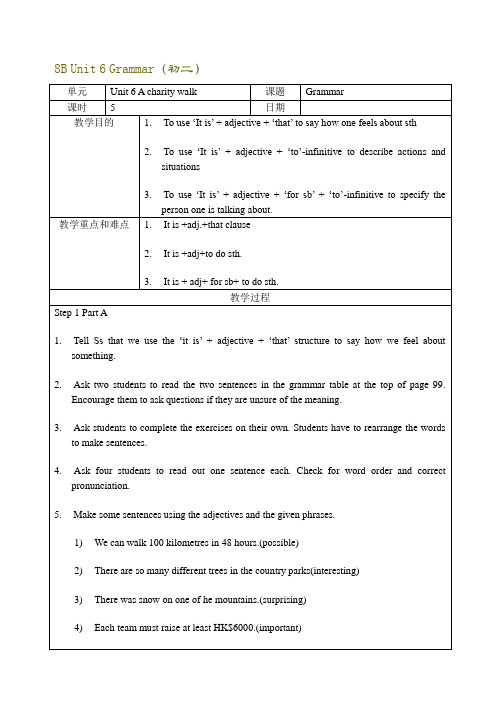
教学过程
Step 1 Part A
1.Tell Ss that we use the ‘it is’ + adjective + ‘that’ structure to say how we feel about something.
3.Check that Ss have understood the structure.
4.Explain the context of the exercises. Ss are telling Amy how she can make a useful contribution to society. Tell them to make sentences using the words in brackets and the verbs from the box.
Step 2 Part B
1.Explain that the ‘It is’+adjective +’to’-infinitive structure is similar to the structure students learned in Part A except that here, the adjective describes an action or activity.
3.Check that students have understood the structure.
4.Explain the context of the exercises. Tell them to complete the conversation using he words from the box.
牛津译林版英语 八年级下册 8B Unit 6 Reading1教案
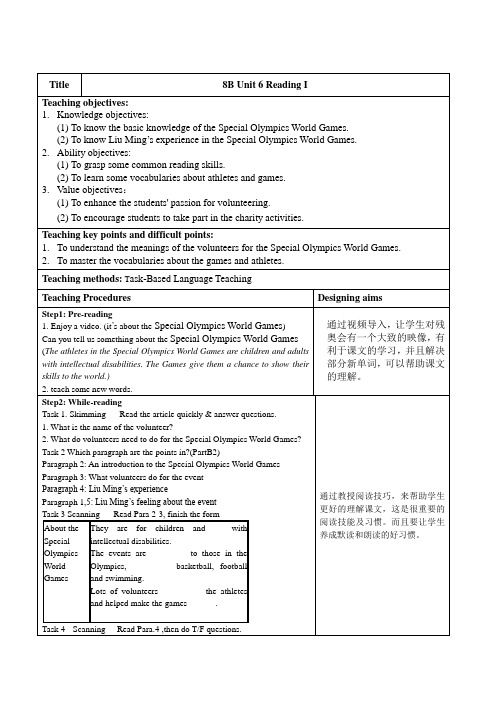
Teaching methods:Task-Based Language Teaching
Teaching Procedures
Designing aims
Step1:Pre-reading
Paragraph 2: An introduction to the Special Olympics World Games
Paragraph 3: What volunteers do for the event
Paragraph 4: Liu Ming’s experience
Paragraph1,5: Liu Ming’s feeling about the event
1. Enjoy a video. (it’s about theSpecial Olympics World Games)
Canyou tell us something about theSpecial Olympics World Games
(The athletes in the Special Olympics World Games are children and adults with intellectual disabilities. The Games give them a chance to show their skills to the world.)
Task 3Scanning---- Read Para 2-3, finish the form
AbouttheSpecialOlympics WorldGames
They are for children and ____with intellectual disabilities.
牛津英语 8b unit6 reading教学教材
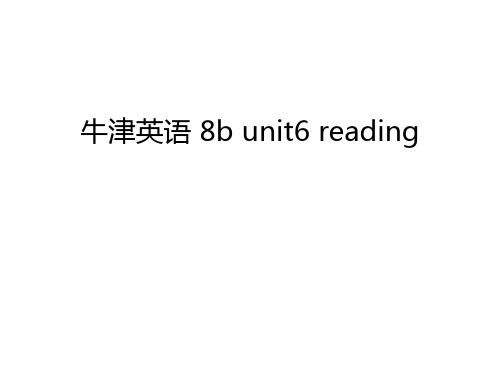
Task3 Replace each of the underlined parts with a word or phrase.
Simon: Have you heard of the the Special international sports festival Olympics
for people with intellectual 1._W__o_r_ld__G_a_m__es
disabilities? Annie: Yes, and I know some people offer to help without
getto_lu__n_te_e_r__
How do they help?
Simon: They give up their
牛津英语 8b unit6 reading
Objectives
➢ To get the main points of the paragraphs ➢ To get more information about the Special Olympics World Games ➢ To learn some words and expressions from the report
___F__
4. There were over 40,000 volunteers for
They need to provide support for the athletes and help make the event a great success.
Task2
watch the flah and do T or F
Do T or F.
1. Liu Ming was a volunteer in the 2007
牛津译林版英语 八年级下册 8B Unit 6 Grammar教案
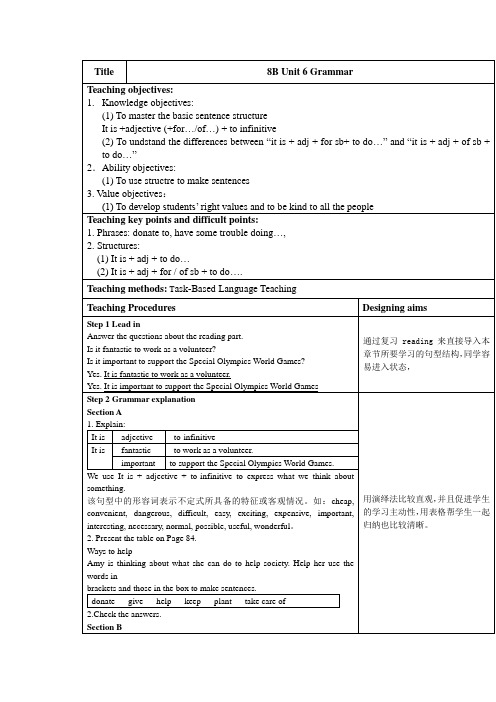
to win the competition.
possible
her
to work for the charity on Saturday.
for引出逻辑主语
2.Present the table on Page 85.
Asking about the volunteer work
Simon is a volunteer now. He works for people with intellectual disabilities. Amy is asking him about his work. Complete their conversation with the phrases in the box.
2.Ability objectives:
(1) Touse structre to make sentences
3.Value objectives:
(1) To develop students’ rightvalues and to be kind to all the people
Teachingkeypoints and difficult points:
你能为需要帮助的人做些事情真的很善良。
We can useIt is + adjective + of... + to-infinitiveto express what we think of someone's actions.
It is
adjective
of
someone
to-infinitive
Teaching Procedures
Designing aims
牛津译林版8BUnit6(1-4课时)教学案

8B Unit6 Sunshine for all第一课时Comic & Welcome (新授课)日期_______主备人:审核人:______审批人:______ 班级:_________姓名:___________【学习目标】1,了解并掌握一些描述弱势群体的词汇,2,学会使用适当的词语谈论如何帮助弱势群体3,梳树立同情弱者,乐于助人的意识【学习重难点】能用英语谈论如何帮助弱势群体一、课前预习·导学1.接受培训___________________2.有了父母的支持___________________3.一个身体有残疾的人___________________4.一个老年人___________________5.一个无家可归的人___________________6.一个盲人___________________7.帮助盲人过马路__________________8.还需要一些食物___________________二、课堂学习研讨1. traina.动词“锻炼,训练,培养”e.g.①He is training to be a doctor.②He trained the dog to help blind manb.名词“火车,列车”e.g. I got up late this morning,so I didn’t catch the train.c.相关短语:be trained in 在…方面接受训练/ train for a charity walk2. It’s meaningful to do sth.e.g. It’s meaningful to donate money to Project Hope.3. need的用法a.行为动词“需要”,I d on’t need money.He needs to buy a new mobile phone.She doesn’t need your help, so you needn’t help her.a.need 意思是“需要”在这句中是实义动词,后接动词不定式或名词;也可以作情态动词用,后接动词原型(注:当need作情态动词时,常用于否定、疑问式)。
牛津英语8B-Unit6教案

牛津英语8B Unit 6 A green worldUnit6 The 1st periodContent: Comic strip & Welcome to the unitTeaching aims:1 To learn about how to protect the environment2 To have a discussion about what we should try our best to protect the environment.Teaching procedures:Step 1: Revision.Review the passive voice.Step 2:Learn the new words .Step 3: Welcome to the unit1. Introduce how to protect the environment2.Finish A. match the pictures with the correct sentencesStep 4: Comic strip.1.Listen to a short dialogue and think about the following questions:1)What will be planted this year?2)Why does Hobo want to plant more trees?3) Does Eddie want to come with Hobo?4) What does Eddie want to plant?2. Listen to the dialogue again and try to repeat after the tape.Step 5 : Dialogue1.Lead in Part BTeacher asks students why Kitty has decided to ride her bicycle to school.2.Key points:1)decide to do sth.2)from now on3)drive sb. to school4)lead to5)turn on/off6)by doing sth.7)go outStep 6: Homework:1. Recite the conversation.2. Finish the workbook.Blackboard :Summary:Uni6 the second periodContent: ReadingTeaching aims:1. to learn about the enviromental protection measures of Switzerland2. Tostrength the awareness of enviromental protection3. Passive voiceImportant and difficult points:1.The understanding of the reading2.Some useful expressions3.How to use the passive voice correctly.Teaching procedures:Step 1:Review some passive voice.Step 2: New words learning.Step 3: Read the text and learn.Step 4: Explain the meaning of the textStep 5:Learn some useful expressions.1.online friend2.with3.take active steps to do sth.4.sort rubbish into different types5.such as/ for example6.separate into7.learn about8.from all over the country9.cut down trees10.creat electricity from11.run out12.what’s more13.try one’s best to do sth.Step 6 Listen to the tape and read the text .Step 7 Do the exercises of part B .Step 8 Homework:1. Remember the new words.2. Finish the workbook.Blackboard:Summary:Unit 6 The third periodContent: GrammarTeaching aims:1.Students can use the passive voice in present tense correctly.2.Students can use the passive voice in simple future tense correctly. Teaching Procedures:Step1.New words learning..Step 2.The passive voice in present perfect tenseWe use the passive voice in the present perfect tense when the action took place in the past and continues to the present or still has a connection with the present.e.g. We have made twenty more keysTwenty more keys have been made by us.Step 3. The passive voice in simple future tenseWe use the passive voice in the simple future when the action has not taken place yet.e.g. Students will clean the classroom.The classroom will be cleaned by students.Step 4.ExercisesTranslate Chinese in to English:1.你已经收到多少卡片了?2.所有的树都已经被他种在公园了。
牛津8B Unit6教学案

牛津8B Unit6教学案牛津8B Unit6教学案8B Unit 6 A harit al 第一时教学案【教学目标】1 Enable the students t g n learning se vabular abut harit 2 Enable the students t tal abut peple h need help3Learn h t help peple in need【预习导学】1预习,熟读P 93生词并做练习:瞎的,失明的_______聋的______残疾人_______________/____________无家可归的人_________________2熟读i strip and guess the tpi f Unit 6________________________3在i strip中画出下列句子并翻译1) I’training fr a harit al____________________________________2) it’s eaningful t supprt harities_____________________________________3) I need se re fd during the al_____________________________________4) I dn’t thin u’ll ever finish ur al_____________________________________4 预习P93 and ae a list f peple h need help:___________________________________________________________ _________________________________________________________________ _____【典型例题精析】1 help sb (t) d sth / help sb ith sth 帮助某人干某事举一反三:Sin ften_____ _______ _______ ________/______ ______ _____ _____ ______(帮我学英语)2 deaf ad聋的,失聪的,在句中作表语时主语一般是人不是ear(s)He an’t hear anthing beause he is deaf 他什么也听不见因为他是个聋子deaf 用作形容词也可用作定语,所修饰的词既可以是人也可以是ear(s)举一反三:因为聋,他不能学说话Beause he _______ _______,he uld nt learn t spea他听不见你说话,因为他是个聋子He an’t hear u, beause he is______ _______ _______3 Sure, it is eaningful t supprt harities当然,支持慈善机构是有意义的事句型结构为:It is +ad+ t d sth做某事怎么样举一反三:学好英语很要___________________________________________4 I need se re fd during the al在行走时我还需要一些食物Here “re ” 用在数字后或相当于数字的词后面表示“再” “又”, 数字+re=anther+数字,表示又几个”举一反三:他又游了两小时He sa antherT hurs/ ________ _______ _______I dn’t thin u ill ever finish ur al我认为你将不会完成你的毅行句子中的dn’t否定的是从句,类似的从句中的否定前移的句子还有I believe/suppse…,该结构的反意疑问句应与从句保持一致举一反三:I dn’t thin he has been t Beiing,______ _______?6hat abut heless peple? 无家可归的人呢?hat/H abut…? 是特殊疑问句的一种形式,用询问对方情况及征求意见和看法举一反三:现在休息一会儿怎么样?_________________________? 【目标达成检测】1单项选择:1) His rds see t be _______ I hpe u an thin the verA thanfulB eaningful eaningless D eas2) –uld u lie t have _________bread?-N, thans I’fullA a fe reB se re re a fe D re se3)It is iprtant _______ t the anials, beause the are ur friends A t ind B t be ind be ind D ind4) It is reprted that lts f peple beae _____beause f the fld A bring B brave exited D heless) I dn’t thin he ill e t ur part,_________?A ill heB ill I des he D d I2 根据汉语意思完成句子:1)你愿意支持慈善机构?ill u__________ ___________?2)帮助老人是有意义的事。
八年级英语:牛津8B Unit6教学案(教案文本)

初中英语标准教材八年级英语:牛津8B Unit6教学案(教案文本)Learning English is conducive to understanding the customs and culture of othercountries, reading foreign books, etc.学校:______________________班级:______________________科目:______________________教师:______________________--- 专业教学设计系列下载即可用 ---八年级英语:牛津8B Unit6教学案(教案文本)牛津8b unit6教学案8b unit 6 a charity walk 第一课时教学案【教学目标】1. enable the students to go on learning some vocabulary about charity.2. enable the students to talk about people who need help.3.learn how to help people in need.【预习导学】1.预习,熟读p 93生词并做练习:瞎的,失明的_____聋的____残疾人_____/____无家可归的人_____2.熟读comic strip and guess the topic of unit 6____.3.在comic strip中画出下列句子并翻译.1) i’m training for a charity walk.______2) it’s meaningful to support charities._______3) i need some more food during the walk._______4) i don’t think you’ll ever finish your walk._______4. 预习p93 and make a list of people who need help:_____________________.【典型例题精析】1. help sb (to) do sth / help sb with sth 帮助某人干某事举一反三:simon often_____ _____ _____ ____/____ ____ _____ _____ ____(帮我学英语).2. deaf adj.聋的,失聪的,在句中作表语时主语一般是人不是ear(s)he can’t hear anything because he is deaf. 他什么也听不见因为他是个聋子.deaf 用作形容词也可用作定语,所修饰的词既可以是人也可以是ear(s)举一反三:因为聋,他不能学说话.because he _____ _____,he could not learn to speak.他听不见你说话,因为他是个聋子.he can’t hear you, because he is____ _____ _____.3. sure, it is meaningful to support charities.当然,支持慈善机构是有意义的事.句型结构为:it is +adj.+ to do sth.做某事怎么样举一反三:学好英语很要._________..4. i need some more food during the walk.在行走时我还需要一些食物.here “more ”用在数字后或相当于数字的词后面表示“再”“又”, 数字 +more=another+数字,表示又几个”举一反三:他又游了两小时.he swam anothertwo hours/ ____ _____ _____.5.i don’t think you will ever finish your walk.我认为你将不会完成你的毅行.句子中的don’t否定的是从句,类似的从句中的否定前移的句子还有i believe/suppose…,该结构的反意疑问句应与从句保持一致.举一反三:i don’t think he has been to beijing,____ _____?6.what about homeless people? 无家可归的人呢?what/how about…? 是特殊疑问句的一种形式,用来询问对方情况及征求意见和看法举一反三:现在休息一会儿怎么样?_____?【目标达成检测】1.单项选择:1) his words seem to be _____. i hope you can think them over.a. thankfulb. meaningfulc. meaninglessd. easy2) –would you like to have _____bread?-no, thanks. i’m full.a. a few moreb. some morec. more a fewd. more some3)it is important _____ to the animals, because they are our friends. a. to kind b. to be kind c. be kind d. kind4) it is reported that lots of people became _____because of the flood. a. boring b. brave c. excited d. homeless5) i don’t think he will come to our party,_____?a. will heb. will ic. does hed. do i2. 根据汉语意思完成句子:1)你愿意支持慈善机构?will you____ _____?2)帮助老人是有意义的事。
牛津译林8B U6(T同步)教案

成就孩子成就未来1 学员编号: 年 级: 课 时 数:学员姓名:YYY 辅导科目:英语 学科教师: XX授课类型T-8B U6- A charity walk授课日期及时段(建议2-5分钟)请学生认识下列词汇sun shineclass roomworld widewild lifeevery dayfoot ballrain coatfirst aid批注:认识组合词汇,老师引导学生增加词汇量(建议20-25分钟)一、词汇Words1. group v.集合,成组e.g. Group together in four!每四人一组批注:这里group 是动词2. in need 意思是贫困,危机时刻e.g. A friend in need is a friend indeed.患难之交才是真朋友。
批注:Why not try your best to help people in need?为什么不清尽全力帮助那些有困难的人呢?3. pay attention to 注意…批注:Please pay attention to what I am going to say. 请注意我将说的内容。
Attention please! 请大家注意。
经常在机场车站的语音广播中听到。
4. further是far的比较级,表示更多的,更进一步的e.g. Do you have any further questions? 你还有其它问题吗?For further information, please contact Amy on 555555. 若有疑问,请致电Amy 555555。
批注:far的比较级是不规则变化far-farther-further5. during the walk during 在……的期间during ,in 与for 的辨别:1) during 用于某事是在某一段时间之内发生,强调动作或状态的迟续性如:During those three months he asked a lot of questions.在那三个月内他问了许多问题。
牛津译林版八年级英语下册8B Unit 6 Sunshine for all 教案1

trainv.训练;培训
e.g. If youtrainhard, you'll make a good footballer.
你要刻苦训练就能成为优秀的足球运动员。
Step 7 Exercises
blind, deaf, disabled, elderly, homeless, poor
Keys:
1.disabled 2.poor 3.blind
4.elderly 5.homeless 6.deaf
Step 4 Free talk
Ask the students to talk about the question:
Keys:
1.He is training to be a volunteer for the Olympic Games.
2.Yes, he will.
3.He needs some more food to eat at work.
4.Act the dialogue out.
Step 6 Language points
Recite the dialogue between Eddie and Hobo.
IComplete the sentences.
1.It’s _____________ (mean) to help people in need.
2.My father needed a pair of scissors ___________ (cut) out some pieces of cards.
Have you ever helped people who need help?
8B Unit6教案
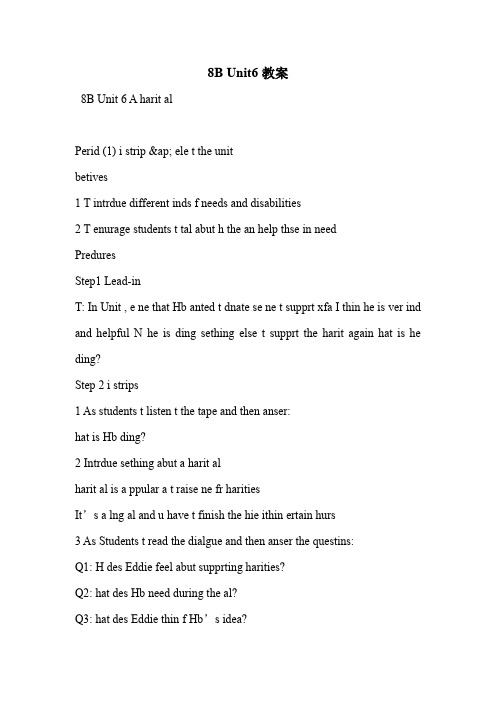
8B Unit6教案8B Unit 6 A harit alPerid (1) i strip ≈ ele t the unitbetives1 T intrdue different inds f needs and disabilities2 T enurage students t tal abut h the an help thse in needPreduresStep1 Lead-inT: In Unit , e ne that Hb anted t dnate se ne t supprt xfa I thin he is ver ind and helpful N he is ding sething else t supprt the harit again hat is he ding?Step 2 i strips1 As students t listen t the tape and then anser:hat is Hb ding?2 Intrdue sething abut a harit alharit al is a ppular a t raise ne fr haritiesIt’s a lng al and u have t finish the hie ithin ertain hurs3 As Students t read the dialgue and then anser the questins:Q1: H des Eddie feel abut supprting harities?Q2: hat des Hb need during the al?Q3: hat des Eddie thin f Hb’s idea?4 As students t read after the tape and iitate the prnuniatin and intnatinhe students’understanding f the flling:1) It’s eaningful t supprt harities‘It’s + ad + t d sth’2) need se re fd3) I dn’t thin u ill ever finish ur al6 As students t pratie in pairs and then at ut the dialgueStep 3 Peple h need help1Intrdue different grups f peple h need help in ur dail life ith the help f se pitures2 D se exerises t see if students understand the ne rds1) hen e see _________peple, e an help the rss the rad2) If e see ________peple, e an help the g upstairs3) e an give_______peple se fd and lthes e an als teah the h t ae theselves rih4) hen e eet the ________ n the bus, e shuld give seats t the) hen e see se ________ peple, e ustn’t laugh at the e an tal ith the ith pens6) e an help ________ peple g ba t their hetns3 As students t disuss in grups f fur t get re ideas t help the peple h need help After that, listen t their ideas first and then give the se suggestins Step4 ral pratieAs students t ae their n dialgues abut helping the peple in need, using Daniel and Sin’s nversatin as a del Students an add sething re if the lie A: H an e help_____________?B: e an ________________A: hat abut _______________?B: e an ____________________Step Her1 Reeber all the ne rds and expressins2 Reite the dialgues3 ExerisesPerid (2) Reading (1)betives1 T read an artile abut a harit al2 T infer eanings fr erds and ntexts3 T identif true r false stateents based n the reading passagePreduresStep 1 RevisinAs students t get read fr the questins in ne inute:1) h are there s an harities in hina r in the rld ?2) In ur pinin, hat inds f peple need help ? H an e help the?Step 2 Lead-in ≈ ne rds1 As students t l at the lg f xfa Trailaler and as the:hat des the lg l lie?2 Intrdue sething abut xfa Trailaler and teah the ne rds at the sae tie3 As students t finish Part B1 and then he the ansersStep 3 Reading1 Fast reading:1) an u give e an intrdutin t xfa Trailaler?2) Is xfa Trailaler an eas hie?3) Tea spirit is ver iprtant in it, isn’t it?2 areful reading1) Read Para1-2 and anser:Q1: here is xfa Trailaler held ever ear?Q2: h an in xfa Trailaler?Q3: hat is the ai f xfa Trailaler?Q4: Is xfa Trailaler a diffiult al?2) Read Para3-4 and anser:Q1: Is it neessar fr tea ebers t supprt and help eah ther befre and during the event? h?Q2: hat is the b f a supprt tea?Q3: hat ill the ne be used fr?3) Read Para and anser:hat shuld e d if e ant t tae part in the harit al?3 T r F:1) xfa Trailaler is rganized b the Red rss2) If u are 16, u an in the event3) Teas have t al 100 iletres in 48 hurs4) The rute ges thrugh 6 untr pars) The dn’t need t al tgether6) Teas have t arr everthing the need7) Eah persn ust raise at least H$6,0008) It’s eas t finish the al4 As students t read after the tape and then fill in the blans ith their bs lsed:xfa Trailaler is held in__________ever ear sine 1981 Peple ver_______ ears ld an fr grups f fur t in the event Its ai is t help peple in __________ and ther parts f Asia and ______ Peple h in in the ativit have t al______ iletres ithin_____ hurs The have t al thrugh eight untr_______ and ver ______ hills and untains A supprt tea an prvide the ith ______ and _______ during the al The ill als bring ar and dr lthesFinish Part 1 and then he the ansers6 Help students understand se diffiult sentenes:1) xfa Trailaler has been ne f Hng ng’s biggest fund-raising events sine 19812) Peple ver eighteen an grup theselves int a tea f fur and in this harit al3) It is an exellent hane fr peple t learn tea spirit4) It is neessar fr u t supprt and help eah ther befre and during the event ) It is useful t have supprt teas t bring u fd and drins6) It is neessar that u start training a fe nths befre the alStep 4 Her1 Pratie reading the text and tr t retell the text2 Reeber the ne rds, phrases and sentenes3 ExerisesPerid (3) Reading(2)betives1 T get a thrugh understanding f the artile2 T learn re abut xfa Trailaler in details3 T tal abut xfa Trailaler flentl and freel4 T learn se language pintsPreduresStep 1 RevisinAs students t retell the text arding t the flling questins:1) hen as it set up?2) h rganizes it?3) H ften is it held?4) h is it held?) h an in it?6) H far is it?7) H lng des it tae?8) hat d u need during the al?9) hat shuld u bring?10)H uh ne des eah tea raise?11)H is the al?12)hat shuld u d befre the al?Step 2 Language pints1 It as nn as Trailaler befrebe nn as 作为……而知名苏州作为一个园林城市而闻名。
牛津译林版英语 八年级下册 8B Unit 6 Welcome to the unit教案

Teaching methods:Task-Based Language Teaching
Teaching Procedures
Designing aims
Step1:Guessing game (lead-in )
One more question: what about other people? (discuss in group)
b. Read PartB again, let students to make a new conversation to discuss the people in PartA.(What can we do for them?And what can other people / government do for them ?)
2.Ability objectives:
(1) Toknow the people who need help.
(2) To learn to use the useful wordsand phrases to describehow to helpthepeople in need.
3.Value objectives:
Step2:Welcome to the unit
1.As we know, volunteers help the people in need,I’ll show the people who need help.Let’s look at the pictures. (learn the new words andexplain some languang points)
- 1、下载文档前请自行甄别文档内容的完整性,平台不提供额外的编辑、内容补充、找答案等附加服务。
- 2、"仅部分预览"的文档,不可在线预览部分如存在完整性等问题,可反馈申请退款(可完整预览的文档不适用该条件!)。
- 3、如文档侵犯您的权益,请联系客服反馈,我们会尽快为您处理(人工客服工作时间:9:00-18:30)。
Unit 6 A charity walkPart 1 Teaching design第一部分教学设计Period 1 Comic strips & welcome to the unit (Organizing a charity walk, People who need help)Teaching goals●To learn some expressions●To learn about people who need helpTeaching proceduresStep 1 Looking and sayingHi, class. Look at the pictures on page 92. Read after me what Hobo and Eddie are saying.Now learn these words and expressions from this part.Make sentences of your own with them.Step 2 Listening and answeringWhat will Hobo and Eddie do to support charities?What is Hobo doing for charity walk?Is Eddie willing to support charities?What does he think of supporting charities?What does Eddie give Hobo?What does Hobo need?What does Eddie think of Hobo’s walk?Step 3 Reading after the tape and discussingRead after the tape sentence by sentence.Is it possible for Hobo to finish his walk?Why or why not?What do we need during a charity walk?Step 4 Questioning and answeringWhy are there some charities in the world? (Because there are many people who need help.) What kind of people need help? (The blind, the deaf, the disabled, the elderly, the homeless, the poor.)Look at the pictures on page 93. And read after me the words disabled, elderly, homeless, and deaf.Step 5 Finishing off Part A and BNow let’s go on to label the pictures in Part A using the words from the box.OK. Work in pairs to act out the conversation on page 93 by Arm and Daniel.How can we help people in need?How can we help blind people/homeless people/deaf people…?●For people in wheelchairs, wide sidewalks, ramps and automatic doors are helpful.●For poor people, education programmes that allow them to get better jobs are helpful. Free medical care and affordable housing are also helpful.●Blind people can benefit f rom Braille signs, spoken announcements rather than written notices, contoured pavements and unobstructed sidewalks.●Elderly people can benefit from public transit that is easy to board, places to sit down outdoors and escalators or lifts instead of stairs.●For homeless people, shelters and kitchens can offer short-term help.●Deaf people can benefit from written notices and a greater awareness of sign language.Make a similar conversation like this.Step 6 Doing an extension activityYou are to make a list of things you would find most difficult to do or you would miss if you were blind, deaf, elderly, homeless, physically disabled or poor.Make sure that you write a few sentences about a person who suffers from any of the conditions shown in the pictures. Write your sentences from that person’s viewpoints.Step 7 Homeworka. Read the comic strips and try to remember it. Try your best to act it out.b. Finish off the exercises in the Evaluation HandbookPeriod 2 Reading I(We need your support Oxfam Trailwalker)Teaching goals●To understand the structure of the sentences●To find the organization of the text●To skim for overall meanings and scan for details●To identify specific information about Oxfam TrailwalkerTeaching proceduresStep 1Reading the passages togetherHello, class. Today we go to page 94 to read an article entitled We need your support Oxfam Trailwalker.But first let’s listen to and read the text to the tape. Try to divide the sentences into sense groups while reading aloud.Step 2 Figuring out what each paragraph is talking aboutFigure out what each paragraph talks about.Paragraph1: What is Oxfam Trailwalker?Paragraph2: Oxfam Trailwalker is a long, difficult walk.Paragraph3: Team spirit and supportParagraph4: Support teamsParagraph5: Fitness and trainingStep 3 Making a flow chart about Oxfam TrailwalkerWe shall try to make a flow chart about Oxfam Trailwalker.Step 4 Retelling the story with the help of the chartOxfam Trailwalker has been in practice in Hong Kong since 1981. It is a c_____ event. Oxfam Hong Kong organized it to raise money for helping p_____ people. It is held in N_____ every year. Only the people o_____ 18 can join it.Oxfam Trailwalker is very t_____. People need to g_____ themselves into a team of four and finish walking a 100-meter trail w_____ in 48 hours. They also must raise at l_____ HK$6,000.During the walk, all the members must walk together to finish the hike because only the t_____ finishing time will be recorded. So people in the same group need to help each other. It is a great chance to learn team s_____.Because people have to walk two days and nights without s_____. They should start t_____ a few months before the walk. They also need s_____ teams to bring food, drinks and warm clothes for them.I want to join Oxfam Trailwalker. I believe it will be an e_____ I will never f_____.(Keys: charity, poor, November, over, tough, group, walk, least, team, spirit, sleep, training, support, experience, forget)Step 5 Explaining language points1.group…into…2.It’s necessary for you to…3.It’s useful to…4.It is necessary that…5.have sb. to do sth.6.keep you comfortable7.at least8.be used to do9.try one’s best to do sth.10.Why not do…?Step 6 Doing additional exercises用所给词组的适当形式填空1.If we want to win a team sport, we should have_____.2.You should put the milk into the fridge. It can only keep fresh _____.3.We must _____learn English well because it’s more and more useful.4.Although that little boy is 6 years old, he often _____money _____Oxfam.5.It’s dark outside. I _____leave now.6.Peter is quite happy because he has just _____his homework.7.We want to help the _____with the donations.8.Mary broke her leg yesterday. So she needs to stay in bed for _____a month.9.Every morning, my grandfather_____physical exercises at 6 o’clock.10.In the English class, the teachers always _____the students _____and ask them to play game. (Keys: team spirit; within 48 hours; try our best to; raises, for; have to; finished doing; people in need; at least; begins doing; groups, into a team of four)Step 7 DiscussingIf you are over 18, will you join the charity walk? Why? What will you do for the walk? How? Step 8 HomeworkUnit 6 A charity walkPeriod 3 Reading II(We need your support Oxfam Trailwalker)Teaching goals●To do exercises to consolidate learning of the text●To read aloud, listen to, write on and speak up about the textTeaching proceduresStep 1 Having a revisionWhat will Hobo do to support charities? (To join in a charity walk )What do you know about ‘charity walk’ in Hong Kong?Step 2 Reading and answeringRead the text on page 94 and then answer the following questions:What is the famous charity walk called? (Oxfam Trailwalker )Which oorganization organizes the event? (Oxfam Hong Kong )Why do we call it ‘Trailwalker’? (Because people have to walk a 100-kilometer trail without sleep.)Can you finish such a walk? Why not? (It’s a difficult/tough hike.)How many people are needed in the walk? (Four)So it is team work. People are grouped into a team of four. They need to work together to supporteach other during the walk. So do you think it’s a very good/excellent chance to learn team spirit? It you take part in such an event, will you remember the experience forever?Step 3 Finishing off Part BRead the new words and expressions aloud on page 96. Match the numbers with the letters to finish Part B, checking the answers with your partner.Step 4 Reading after the tape and answeringRead after the tape and answer the following questions:When did Oxfam Trailwalker start?Who is helped by the money that is raised?When is Oxfam Trailwalker held?Who can join Oxfam Trailwalker?How long does the walk last?What’s the route?How much money does each team need to raise?Step 5 Finishing Part C2Now go to page 97 to fill in the blanks in Part C2, then checking the answers later on.Step 6 Reading and doing additional exercisesRead the text silently, then doing the ‘True’ or ‘False’ exercise s.1.Oxfam Trailwalker is organized by the Red Cross. F2.The money helps poor people in Hong Kong and other parts of Asia and Africa. F3.If you are 16, you can join Oxfam Trailwalker. F4.There are five people in each team. F5.Teams have to walk 100 kilometers in 48 hours. T6.The route goes through 8 country parks. F7.Teams have to carry everything they will need. F8.Each person must raise at least HK$6,000. FStep 7 Acting out the dialoguesRead aloud the dialogues on page 96 and 97. Then in pairs try to act them out. You may make changes to them in structure and in content.Step 8 Homeworka. Read after the tape five times. Your parent’s signature is needed.b. Finish the exercises in the Evaluation Handbook.Period 4 Vocabulary(Creating new words)Teaching goals●To develop an understanding of compound nouns●To guess the meanings of compounds and create nouns using prompts.Teaching proceduresStep 1 Presenting compoundsHello, class. Look at words ‘homework’, ‘football’and ‘bedroom’here. They are formed by putting two smaller words together. Could you draw a line between the two parts of each word? Could you see the two individual words like ‘home’‘work’ that make up the compounds?Step 2 Finishing Part ANow go on to complete the exercises in Part A on page 98 by combining the words to make compounds. Remember you will have to use hyphens in some cases.Step 3 Finishing Part BI t’s a good way to remember some compound words by separating them into two parts. Now help Lily to divide the words into two parts on page 98 in Part B.Step 4 Playing a gameI will divide the class into two teams. I will give each team an equal number of divided words and ask you to reassemble them to make compound words. The first team to assemble all their words correctly is the winner.Step 5 Doing additional exercises找出句中合成词并猜猜其含义1.I dream about going to the moon by spaceship some day.2.When the people on the ship see a lighthouse, they know where to go.3.Evergreen trees have leaves all the time and stay green all year.4.If a near-sighted man lose his glasses, it is dangerous for him to drive.5.In summer, I like staying in the open air and looking for the fireflies at night.Step 6 Homeworka. Read and learn these compound words by heart.b. Finish off the exercises in the Evaluation Handbook and Learning English.Period 5 Grammar I(‘It is’ + adjective + ‘that’ clause)Teaching goals●To learn to use ‘It is + adjective + that’ strucutreTeaching proceduresStep 1 Presenting the structureWhat do you think of ‘Trailwalker’? Is it tough? If you want to join it, you must have strong bodies. So it’s necessary that you start training a few months before the walk.W e use ‘It is + adjective + that’ structure to say how we feel about something.Step 2 PracticingNow go to do the exercises on page 99, checking the answers with your partners.Step 3 Doing additional exercisesBen and Lily are talking about Oxfam Trailwalker. Write what they say using adjectives from thebox and the given phrases.1.we can walk 100 kilometers in 48 hours. (It is possible that … )2.there are so many different trees in the country parks. (It is interesting that …)3.there was snow on one of the mountains (It is surprising that …)4.each team must raise at least HK﹩6,000 ) (It is important that …)5.so many people want to help others in need (It is nice that …)6. the weather is pleasant during the hike (It is lucky that …)Step 4 Doing an extension activityAnswer the following questi ons using ‘It is + adjective + that’ structure:What do you think about that we join the charity walk?What do you think about that some students don’t finish their homework on time?What do you think about that teenagers don’t have enough sleep every day?What do you think about that we walk 100 kilometres within 24 hours?What do you think about that dolphins can draw some pictures?What do you think about that people drive a car after drinking?Step 5 Doing some translation work1.我们有必要天天打扫教室吗?2.学生认真完成作业是非常重要的。
